A limited release in both Indonesian and English by the committee organising the Kiai Kanjeng tour of October 2003. It comprises a thoughtful on the work of Emha and Kiai Kanjeng. It consists of three pieces: Our Neighbours and Us, Who Is Emha Ainun Nadjib and Kiai Kanjeng and Post-Globalism. They are reproduced in full here:
Our Neighbours and Us
The Malaysian literary scene is well familiar with names like Taufiq Ismail, Rendra, Goenawan Mohamad and Abdul Hadi W.M. who are active in Jakarta. The global village that is Jakarta is the sparring arena where artists work, engage in experimentation and lash out at the establishment or status quo with an outpouring of words onto paper or a roaring reading thick in the midst of millions of lives populating the city.
Central Java and Jogjakarta on the other hand holds a different kind of life. The sultan's palaces, history, tradition and social norms are deeply rooted here. Art is still a part of enduring social expression. In a milieu such as this, it is difficult for the avantgardist and the creative rebellion to project an individualism that flies boldly in the face of others. The creative artist is forced to think sensitively in giving meaning to his work so as not to be immediately dismissed. This is where Emha Ainun Nadjib or Cak Nun (and whatever other moniker he goes under) has proven to be adept at accommodating without sacrificing artistic and social visions-deep in the heart of a society that is impoverished and deeply religious while facing under-development and daily hardship.
Emha has taken an unusual cultural stance. His success at inspiring the imagination of the masses in surviving their strife and further taking efforts to enlighten his people, has made Emha's existence a phenomenon in Indonesian culture-a fresh alternative for us to understand the character of our neighbours from Jogjakarta.
A week before the arrival of Ramadhan (18 to 24 October 2003), Emha and his musical entourage Kiai Kanjeng will be visiting us. Ahlan Wa Sahlan-we bid our friends from Kiai Kanjeng a warm welcome.
Organising Committee
PENAKuala Lumpur
October 2003/Syaaban 1424 H
Our Neighbours and Us
The Malaysian literary scene is well familiar with names like Taufiq Ismail, Rendra, Goenawan Mohamad and Abdul Hadi W.M. who are active in Jakarta. The global village that is Jakarta is the sparring arena where artists work, engage in experimentation and lash out at the establishment or status quo with an outpouring of words onto paper or a roaring reading thick in the midst of millions of lives populating the city.
Central Java and Jogjakarta on the other hand holds a different kind of life. The sultan's palaces, history, tradition and social norms are deeply rooted here. Art is still a part of enduring social expression. In a milieu such as this, it is difficult for the avantgardist and the creative rebellion to project an individualism that flies boldly in the face of others. The creative artist is forced to think sensitively in giving meaning to his work so as not to be immediately dismissed. This is where Emha Ainun Nadjib or Cak Nun (and whatever other moniker he goes under) has proven to be adept at accommodating without sacrificing artistic and social visions-deep in the heart of a society that is impoverished and deeply religious while facing under-development and daily hardship.
Emha has taken an unusual cultural stance. His success at inspiring the imagination of the masses in surviving their strife and further taking efforts to enlighten his people, has made Emha's existence a phenomenon in Indonesian culture-a fresh alternative for us to understand the character of our neighbours from Jogjakarta.
A week before the arrival of Ramadhan (18 to 24 October 2003), Emha and his musical entourage Kiai Kanjeng will be visiting us. Ahlan Wa Sahlan-we bid our friends from Kiai Kanjeng a warm welcome.
Organising Committee
PENAKuala Lumpur
October 2003/Syaaban 1424 H
Who Is Emha Ainun Nadjib?
The name 'Cak Nun' is well known among the many Indonesian labourers seeking their fortunes in Malaysia. The Indonesian students in this country are also familiar with that moniker and know it belongs to the poet, essayist and culturalist Emha Ainun Nadjib. His writings are circulated among writers, culturalists and the peoples of Indonesia.
Emha Ainun Nadjib in his younger days was already noted as a poet. Upon returning from his sojourn abroad in the 1980s, he quickly rose in prominence as a columnist in the mass media. His observations (often critical and protesting) on the social, political and economic spheres of his country displayed the kind of intellectual courage that Indonesia had always been famed for.
At the same time, he had gathered a following through the newspapers, television, books and a monthly dialogue event that gathers thousands of people in Jombang, East Java. Known as 'Padang Bulan', the event is also an occasion for mass prayer and incantation.
He now resides in Jogjakarta (the Indonesian City of Culture and History) organising programmes like JAMAAH MAIYAH (JM) "Together with the People" and the performances of Kiai Kanjeng Musical Group which with their gamelan sets, drums, violins, gongs and other instruments, tour the remote villages and districts of Indonesia.
In the week of October 18-24, 2003, with an entourage of 22 poets and musicians, this group will be performing songs, poetry and prayers forming a unique spiritualistic expression.
Emha Ainun Nadjib does not just make poetry or write in the spaces of offices, homes or by the streets. He plunges into the heart of society's turmoils-people displaced from their villages, those suffering emotionally and physically; listening to their grievances and defending their rights till word of it reaches the ears of leaders.
A true artist, Emha does not write to praise the President, the Deputy President or any minister, but he keeps their company so as to convey the question of what can be done to overcome the hardship and difficulties suffered by the people and the nation's culture.
At times this results in him being at odds with authority and on one occasion caused him to resign from his previous post of Head of Cultural Division for the Central Leadership of ICMI (Indonesia Muslim Intellectual Alliance) at the height of Habibie's power.
Fighting for peace and the people's rights, he was one of the few who set foot in the Presidential Palace to convince the failing leadership to relinquish power.
As an independent cultural and intellectual icon, Emha fights through his art to defend lives that suffer under the regimes of Suharto and Habibie to Gus Dur and Megawati.
Yet, can poetry and music-art and songs-protect lives and solve the human crises of the Nusantara? If Rendra and Goenawan Muhamad (each have drawn risks on themselves) are examples of a phenomenon in modern Indonesian culture and literature, Emha represents a different strain of the same phenomenon-with his own style and approach-an artist who has become intimate with the masses.
This moving performance (unique in its ways) will resound in the halls of Dewan Bahasa & Pustaka, in Shah Alam and Ipoh.
Kiai Kanjeng and Post-Globalism
The Kiai Kanjeng Gamelan was initiated by Novi Budianto. It is based on a set of traditional musical instruments and well recognised as a group or community of musicians.
The touring activities of Kiai Kanjeng (KK) is part of Emha Ainun Nadjib's (EAN) social work that takes place in the working classes of his society. The activities are multi-contextual: among others covering culture, religion, spiritualism, social-problem solving and political education. Emha and Kiai Kanjeng exist as a friendly 'community partner' and is fully independent
There are two prime motivations for EAN/KK conducting its activities:
A direct request from communities residing in almost all the districts of Indonesia, regardless of political alignment, religion, sect and race;
The routine programmes of the Jamaah Maiyah (JM) network that gathers each month in six different cities, driven also by the needs of JM segments in the districts.
The former category is administered by the community while the latter is funded by JM itself. All activities of EAN/KK are fully independent, with no sponsorship from any agency or foundation.
Since Gamelan Kiai Kanjeng was established four years ago- that is the period between June 1998 till July 2003, the group has visited more than 21 provinces, 360 regencies, 830 districts and 1200 villages throughout the entire breadth of Indonesia.
Using his own finances, Emha also builds schools in East Java and Jogjakarta. While travelling with KK and JM, Emha is often hailed on the road by people from all walks of life and asked for his assistance: those evicted out of their homes, those outlawed, street urchins, boxers who have been discriminated and many others who seek his counsel and help in their personal or familial matters. Among other requests that come to him from parents include giving names to their newborn babies, and by this, thousands of children today owe their names to him.
EAN/KK tours Indonesia to directly engage with communities living in valleys, fields, holding forums at deadened alleys, in villages-just establishing some modest ways to:
1. Commonly seek in group discussions-values and reasons to remain spirited no matter what the circumstances;
2. Study the current situation in a knowledgeable manner so as to not lose hope in an uncertain nation;
3. Entertain for spiritual wellbeing, consciously seeking a form of entertainment that does not destroy life.
4. Other objectives of the initiative may seem rather unusual:
5. To develop and culturalise within the society an enlightened way of thinking
6. To disseminate a healthy political education, awareness of rights and responsibilities as a human being and a citizen;
7. To ensure that every event is attended to by members of all levels of society, faiths, races, political parties and segments that divide the locality;
8. To identify local issues and national problems and discuss possible solutions;
9. To bring local administration, bureaucrats or even the military into direct dialogue with the people; and to sing together where a military Commander may duet with a trader, a labourer or a Regent can dance with a farmer;
10. On several occasions, mentally unstable individuals, those who suffer from stress, the depressed (some of whom have come near to be beaten up by security forces)-are brought by Kiai Kanjeng onto the stage where they participate in dialogue and by this process are humanised to the audience;
11. Kiai Kanjeng also seeks to make itself present within the circles of prostitution, timber thieves, farmers, labourers and others similarly. A discussion is raised as to their situation and fate;
12. To encourage self sustenance, respect for one's own cultural heritage to the extent of even pride in one's own traditional songs. Yet, not to influence them to have a puritanical view of world developments. All elements coming from thousands of sources of globalisation is to be tackled with a spirit of independence-not spurned or hidden from but yet not to be taken without question;
13. Because the communities faced by Kiai Kanjeng is multifaceted, it is prepared to undertake all manner of musical forms, from ethnic to modern. If the Kiai Kanjeng gamelan cannot reach a certain note or key, it will strive to perform with whatever else is left, and at the most minimal, the combo will be used;
14. Because the majority of Indonesians are Muslims, the music trove of Kiai Kanjeng is largely made up of songs persuasive towards an Islamic culture. Yet, as can be seen from a previous 6-city tour of Egypt where Kiai Kanjeng adopted a performance based on the songs of the legendary Egyptian singer Ummi Kalsum, the ensemble remained persuasive of local cultures without abandoning their creative artistic responsibilities. The same approach is extended to any village or province that they tour in.
The musical exploration of Kiai Kanjeng does not restrict itself to types and forms of music. Since the instruments of Kiai Kanjeng possess numerous possibilities, their creative explorations take on many shades: from exploring traditional Javanese, Sunda, Malay and Chinese music to unearthing ethnic forms like Madura, Mandra, Bugis and many others. Kiai Kanjeng has many times performed at international gamelan festivals and does not shut itself from modern Western numbers: pop, blues, jazz (and even invited to perform at the Jak-Jazz Festival). Certainly, their repertoire does not forget the all-popular Indonesian dangdut.
During the 6-city tour of Egypt, KK took it upon itself a rearrangement of the songs of Ummi Kalsum (famed as 'The Eastern Star") and this effort was well received by the Egyptian audience.
Yet Kiai Kanjeng is not a group similar to other musical outfits. This is largely due to its mission of not primarily for music and the arts, but as a comprehensive social communication and process. This phenomenon is uncommon, and its fame is spread by word of mouth-though it is relatively unspoken about in the Indonesian music constellation especially in its modern music industry.
Emha Ainun Nadjib speaks of KK's global exploration as a stance of 'post-globalism' which it imprints in different spheres of human and social life.
To remain conservative in a traditional culture renders humans extinct from history, but to prepare oneself to be swept by a culture of globalisation renders a person to become merely a cultural servant marshaled by capitalistic industry. Resisting globalisation does not have to be by way of traditional-local puritanism, but by firmly planting one's feet in the traditional ground while offers of globalisation are to be received and considered with an independent personality.
EAN/KK does not oppose traditional music, and neither does it resist modern world music-but is not prepared to be subservient to both. To remain conservative in a traditional culture renders humans extinct from history, but to prepare oneself to be swept by a culture of globalisation renders a person to become merely a cultural servant marshaled by capitalistic industry. Resisting globalisation does not have to be by way of local-traditional puritanism, but by firmly planting one's feet in the traditional ground while offers of globalisation are to be received and considered with an independent personality.
It is not just in music that EAN/KK takes a post-globalist stance, but also in other fields. EAN/KK is in constant touch with various segments of society in the context of culture, religion, technology and bureaucracy - yet is not overwhelmed by such segments. To constantly engage with different regions of politics, yet preserving the independence, honourable nationalism and true spirit of humanity.
Organising Committee, PENA, Kuala Lumpur, October 2003, Limited Edition
Translated by Rosihan Zain

































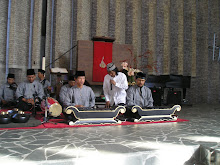
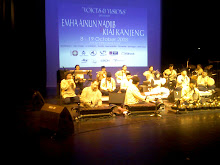

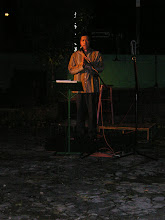



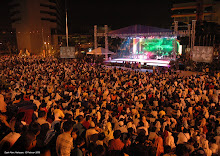
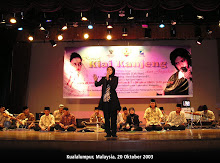
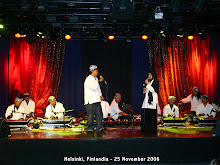.jpg)



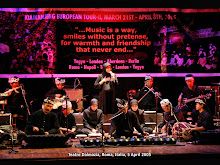


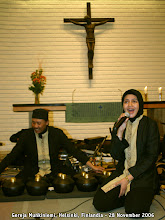.jpg)

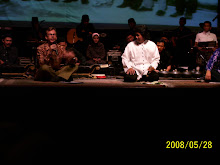.jpg)
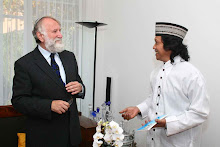
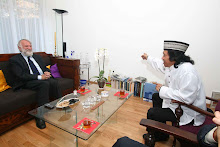
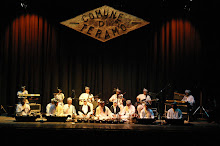


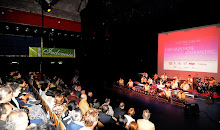

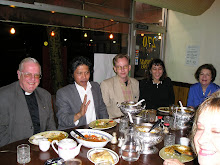


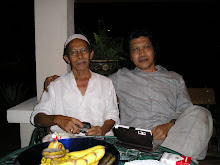
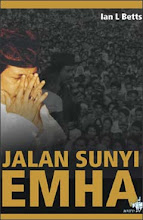
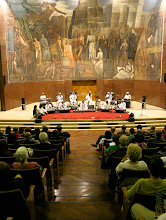
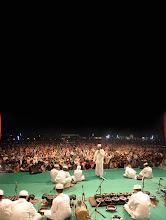

No comments:
Post a Comment